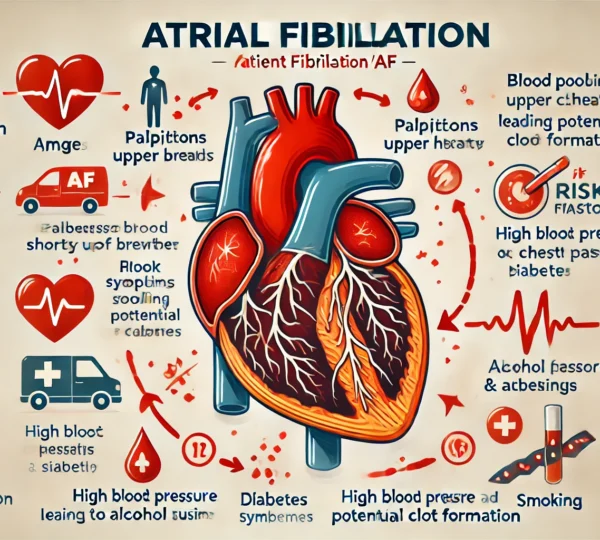
Unraveling the Mystery of Atrial Fibrillation: What Every Indian Patient Must Know to Take Control!
Atrial fibrillation (AF) is a heart condition that causes the heart’s upper chambers (atria) to quiver instead of beating normally. This quivering can cause blood to pool in the atria, which can lead to blood clots. These blood clots can then travel to other parts of the body, such as the brain, and cause a stroke. Understanding the symptoms of atrial fibrillation in adults is essential for timely detection and management.
Symptoms of Atrial Fibrillation:
The symptoms of AF can vary from person to person and may include:
- Palpitations (a racing or fluttering heart)
- Shortness of breath
- Fatigue
- Lightheadedness or dizziness
- Chest pain
- Swelling in the legs and ankles
Recognizing these early warning signs of atrial fibrillation is crucial, especially for those in high-risk groups, such as individuals with existing heart conditions.
Causes of Atrial Fibrillation:
The exact cause of AF is unknown, but there are several factors and risk factors of AF that can increase your likelihood of developing it, including:
- Age: The risk of AF increases with age.
- Family history: If you have a family history of AF, you are more likely to develop it.
- High blood pressure: High blood pressure is a major risk factor for AF.
- Heart disease: Other heart conditions, such as coronary artery disease and heart valve problems, increase the risk.
- Diabetes: Diabetes is a significant risk factor.
- Obesity: Being overweight or obese contributes to higher AF risk.
- Alcohol use: Heavy alcohol consumption increases AF risk.
- Smoking: Smoking damages blood vessels and is a major contributor to heart conditions.
These causes and risk factors of AF are particularly relevant for Indian patients, who often experience higher rates of heart disease and diabetes.
Treatment for Atrial Fibrillation:
There is no cure for AF, but it can be managed with medications to control AF symptoms and lifestyle changes. Treatment options may include:
- Medications: Help control heart rate and rhythm, and prevent blood clots.
- Lifestyle changes: Quitting smoking, eating a healthy diet, and regular exercise are all important.
- Surgery: In severe cases, surgical intervention may be needed.
Managing atrial fibrillation with diet and exercise plays a vital role in reducing symptoms and maintaining heart health.
Atrial Fibrillation in Indian Patients:
AF is a significant health problem in India, affecting around 10 million people. This prevalence is partly due to the country’s large population and high rates of heart disease, diabetes, and limited healthcare access. Understanding the impact of AF on Indian heart health is essential for those at risk, and preventive care is becoming increasingly important.
Preventing Atrial Fibrillation:
There is no certain way to prevent AF, but you can reduce your risk with some proactive measures, such as:
- Quit smoking: This reduces heart disease risk and improves overall health.
- Eat a healthy diet: Focus on fruits, vegetables, and whole grains, and limit saturated fats, cholesterol, and sodium.
- Exercise regularly: Helps lower blood pressure and improves heart health.
- Maintain a healthy weight: Being overweight is a significant risk factor, so achieving a healthy weight can make a big difference.
- Get regular checkups: If you have risk factors for AF, consistent monitoring can help with early detection and management.
Preventing atrial fibrillation naturally through these lifestyle changes and regular check-ups helps reduce complications.
Conclusion:
Atrial fibrillation is a serious condition, but with proper management, the risks can be minimized. If you’re concerned about your AF risk, talk to your doctor. They can help with a personalized plan to assess and reduce your risk of AF, emphasizing strategies to control AF symptoms and prevent blood clots effectively. A proactive, heart-healthy lifestyle can help manage atrial fibrillation and lead to a healthier, longer life.
I hope this article has helped you understand endometriosis better. You can consult a doctor for more information



